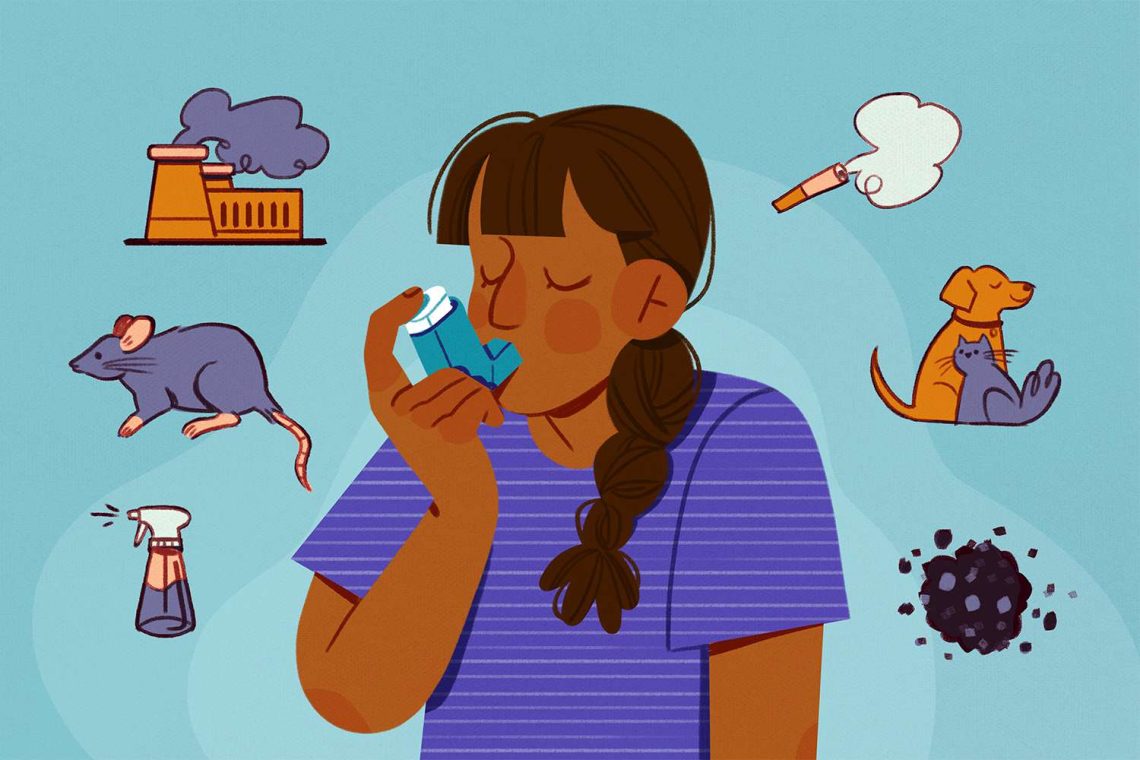Introduction
Asthma is a chronic condition that affects the airways, making them inflamed, sensitive, and prone to narrowing. While asthma cannot be cured, it can be well-managed by recognizing and avoiding triggers that cause symptoms like coughing, wheezing, chest tightness, and shortness of breath. Triggers vary from person to person, but some of the most common include allergens, irritants, physical activity, and weather changes. By understanding these triggers, individuals with asthma can take proactive steps to prevent flare-ups and enjoy a better quality of life.
Allergens
Allergens are substances that can cause an allergic reaction in sensitive individuals. For people with asthma, allergens often lead to airway inflammation.
Common allergen triggers:
- Pollen: From trees, grasses, and weeds—often seasonal.
- Dust mites: Tiny insects that live in bedding, carpets, and upholstery.
- Pet dander: Skin flakes, saliva, and urine from cats, dogs, and other animals.
- Mold spores: Found in damp or poorly ventilated areas.
Prevention tips:
- Keep windows closed during high pollen seasons.
- Wash bedding weekly in hot water.
- Use allergen-proof mattress and pillow covers.
- Control indoor humidity to prevent mold growth.
- Regularly vacuum with a HEPA filter vacuum cleaner.
Irritants
Irritants are non-allergic substances that can inflame or constrict the airways.
Common irritants:
- Tobacco smoke (including secondhand smoke)
- Air pollution and smog
- Strong odors from cleaning products, perfumes, or paint
- Chemical fumes in workplaces
- Wood smoke from fireplaces or stoves
Prevention tips:
- Avoid smoking and exposure to smoke.
- Use unscented cleaning and personal care products.
- Ensure good ventilation when using strong-smelling substances.
- Monitor local air quality reports and stay indoors during poor air quality days.
Exercise
Exercise can trigger asthma symptoms in some people, a condition known as exercise-induced bronchoconstriction (EIB).
Why it happens:
During vigorous activity, rapid breathing can cool and dry the airways, leading to muscle tightening and inflammation.
Prevention tips:
- Warm up before exercising and cool down afterward.
- Use a prescribed inhaler 10–15 minutes before exercise if recommended by your doctor.
- Choose activities with shorter bursts of effort, like walking, swimming, or cycling, rather than prolonged high-intensity sports.
- Avoid exercising in very cold, dry air without protection (like a scarf or mask).
Weather
Weather conditions can have a big impact on asthma control.
Problematic weather patterns:
- Cold air: Can dry and irritate the airways.
- Hot, humid days: Increase air pollution and mold growth.
- Storms and high winds: Stir up pollen and mold spores.
- Rapid weather changes: Affect airway sensitivity.
Prevention tips:
- Cover your nose and mouth in cold weather.
- Stay indoors on high-pollution or high-pollen days.
- Monitor pollen counts and weather forecasts.
- Use air conditioning in hot weather to filter allergens and maintain a comfortable indoor climate.
Conclusion
Managing asthma is about more than taking medication—it’s about understanding and controlling your personal triggers. Allergens, irritants, exercise, and weather can all play a role in worsening symptoms, but with preparation and prevention strategies, it’s possible to reduce flare-ups significantly. Partnering with a healthcare provider, tracking symptoms, and making environmental adjustments are key to living an active, healthy life with asthma.
FAQs
Can asthma triggers be completely avoided?
Not always, but many can be minimized with lifestyle changes and environmental controls.
Is exercise bad for asthma?
No—exercise is healthy. With proper precautions and possibly pre-exercise medication, most people with asthma can stay active.
Do air purifiers help with asthma triggers?
Yes, especially HEPA filter models, which can reduce indoor allergens like dust, pollen, and pet dander.
Can weather changes cause asthma attacks?
Yes, sudden temperature shifts, cold air, or high humidity can trigger symptoms in some people.
Should I take medication daily even if I feel fine?
If prescribed a daily controller inhaler, yes—these medications prevent inflammation and reduce sensitivity to triggers.






